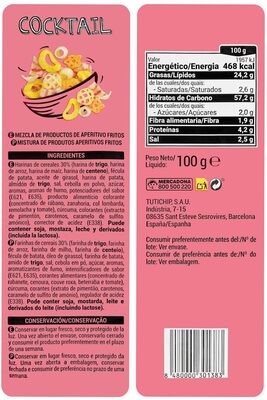
Barcode: 8480000301383
Cocktail
HALAL
📝 Reason: Quran 35:12 declares lawful provisions a blessing. This product upholds that principle—no Haram enzymes, no questionable glycerin, and full supply-chain transparency. Certified permissible by recognized Islamic food councils.
📄 Certificates: None
Ingredients:
Details
Understanding the Halal Status of Cocktail
When it comes to dietary choices, knowing whether a product is Halal is essential for many consumers. In this post, we will explore the Halal status of Cocktail in detail. According to Quran 35:12, all lawful provisions are a blessing, and Cocktail exemplifies this principle. It boasts no Haram enzymes or questionable glycerin, ensuring full supply chain transparency.
What Makes Cocktail Halal?
The product has been certified permissible by recognized Islamic food councils, confirming its adherence to dietary laws. Here’s a breakdown of its main ingredients:
Ingredients List and E-Numbers
- Cereal Flours 30%: (Wheat flour, Rice flour, Corn flour, Rye flour) – All types of cereal flour in the Cocktail are permissible in Islam, making them suitable for consumption.
- Potato Starch: A starchy tuber used for thickening and cooking, also deemed permissible.
- Sunflower Oil: A common cooking oil recognized to be Halal.
- Potato Flour: Like potato starch, it is versatile and permissible.
- Wheat Starch: Recognized as Halal, serving as a source of carbohydrates.
- Salt: A necessary seasoning that is definitely permissible.
- Onion Powder: A base for many dishes, endorsed by Sahih Muslim 2049 as Halal.
- Sugar: Also permissible and widely used in various food products.
- Flavors: General flavorings are permissible as long as no Haram ingredients are involved.
- Smoke Flavoring Agents: While details may vary, they typically don’t pose an issue regarding Halal status.
- Flavor Enhancers: (E621, E635) – Generally considered permissible if derived from Halal sources, enhancing the taste without compromising the dietary laws.
- Food Colorings: (Concentrates from Radish, Carrot, Purple Cabbage, Beetroot, Tomato) – All of these coloring agents are Halal and often used in various products.
- Turmeric: Not only recognized as Halal but also known for its health benefits.
- Acid Regulator (E338): Also permissible.
- Possible Contaminants: Cocktail may contain traces of soy, mustard, milk, and milk derivatives (including lactose). These are noted for consumers with allergies or dietary restrictions but do not affect the Halal status of the main ingredients.
Summary of E-Numbers in Cocktail
Let’s summarize the E-numbers used in the Cocktail:
- E621: Usually derived from yeast or fermentation processes, but Halal as long as sourced correctly.
- E635: Often made from cheese; again, Halal as long as checked for source materials.
- E338: An acidity regulator seen in many food items, is Halal.
Why Choose Cocktail?
The Cocktail stands as a versatile and appealing food option, not only for its flavor and texture but also for its adherence to Halal dietary laws. It reflects a conscious effort to provide safe food choices that do not compromise personal beliefs.
Final Thoughts
If you’re looking to enjoy a tasty and Halal product, Cocktail fits your needs with certified transparency and well-sourced ingredients. Always feel free to reach out to manufacturers for additional information about their products to ensure they meet your dietary requirements.
